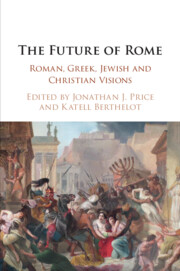Book contents
- The Future of Rome
- The Future of Rome
- Copyright page
- Contents
- Contributors
- Acknowledgments
- Abbreviations
- Introduction
- Chapter 1 Some Remarks on Cicero’s Perception of the Future of Rome
- Chapter 2 Eclogue 4 and the Futures of Rome
- Chapter 3 Imperium sine fine: Rome’s Future in Augustan Epic
- Chapter 4 Posterity in the Arval Acta
- Chapter 5 The Future of Rome in Three Greek Historians of Rome
- Chapter 6 Philo on the Impermanence of Empires
- Chapter 7 From Human Freedom to Divine Intervention
- Chapter 8 Josephus, Caligula and the Future of Rome
- Chapter 9 “Will This One Never Be Brought Down?”
- Chapter 10 The Sibylline Oracles and Resistance to Rome
- Chapter 11 Revelation 17.1–19.10: A Prophetic Vision of the Destruction of Rome
- Chapter 12 Cicero and Vergil in the Catacombs: Pagan Messianism and Monarchic Propaganda in Constantine’s Oration to the Assembly of Saints
- Chapter 13 The Future of Rome after 410 CE
- Appendix
- Bibliography
- Index Locorum
- Index of Names and Places
Chapter 7 - From Human Freedom to Divine Intervention
Agrippa II’s Address on the Eve of the Jewish War
Published online by Cambridge University Press: 24 September 2020
- The Future of Rome
- The Future of Rome
- Copyright page
- Contents
- Contributors
- Acknowledgments
- Abbreviations
- Introduction
- Chapter 1 Some Remarks on Cicero’s Perception of the Future of Rome
- Chapter 2 Eclogue 4 and the Futures of Rome
- Chapter 3 Imperium sine fine: Rome’s Future in Augustan Epic
- Chapter 4 Posterity in the Arval Acta
- Chapter 5 The Future of Rome in Three Greek Historians of Rome
- Chapter 6 Philo on the Impermanence of Empires
- Chapter 7 From Human Freedom to Divine Intervention
- Chapter 8 Josephus, Caligula and the Future of Rome
- Chapter 9 “Will This One Never Be Brought Down?”
- Chapter 10 The Sibylline Oracles and Resistance to Rome
- Chapter 11 Revelation 17.1–19.10: A Prophetic Vision of the Destruction of Rome
- Chapter 12 Cicero and Vergil in the Catacombs: Pagan Messianism and Monarchic Propaganda in Constantine’s Oration to the Assembly of Saints
- Chapter 13 The Future of Rome after 410 CE
- Appendix
- Bibliography
- Index Locorum
- Index of Names and Places
Summary
King Agrippa II’s address to the people of Jerusalem (Josephus, BJ II.342–404) is one of the most impressive and outstanding rhetorical statements from classical antiquity to have survived. Scholars have been dealing with this well-known passage, so central to our understanding of Josephus’s Jewish War, since early in the last century. Until quite recently, most studies focused on the central part of the address – the description of the Roman Empire – extracting information on the political, economic, and, above all, the military situation of the Roman Empire between the final years of Nero’s reign and the early years of Vespasian’s rule.1 A notable exception is M. Rostovzeff. By the early twentieth century, this Russian-American scholar already understood the importance of Josephus’ use of rhetoric and quoted the aforementioned address in an article on the history of political speeches in the Roman Empire.
- Type
- Chapter
- Information
- The Future of RomeRoman, Greek, Jewish and Christian Visions, pp. 130 - 154Publisher: Cambridge University PressPrint publication year: 2020

